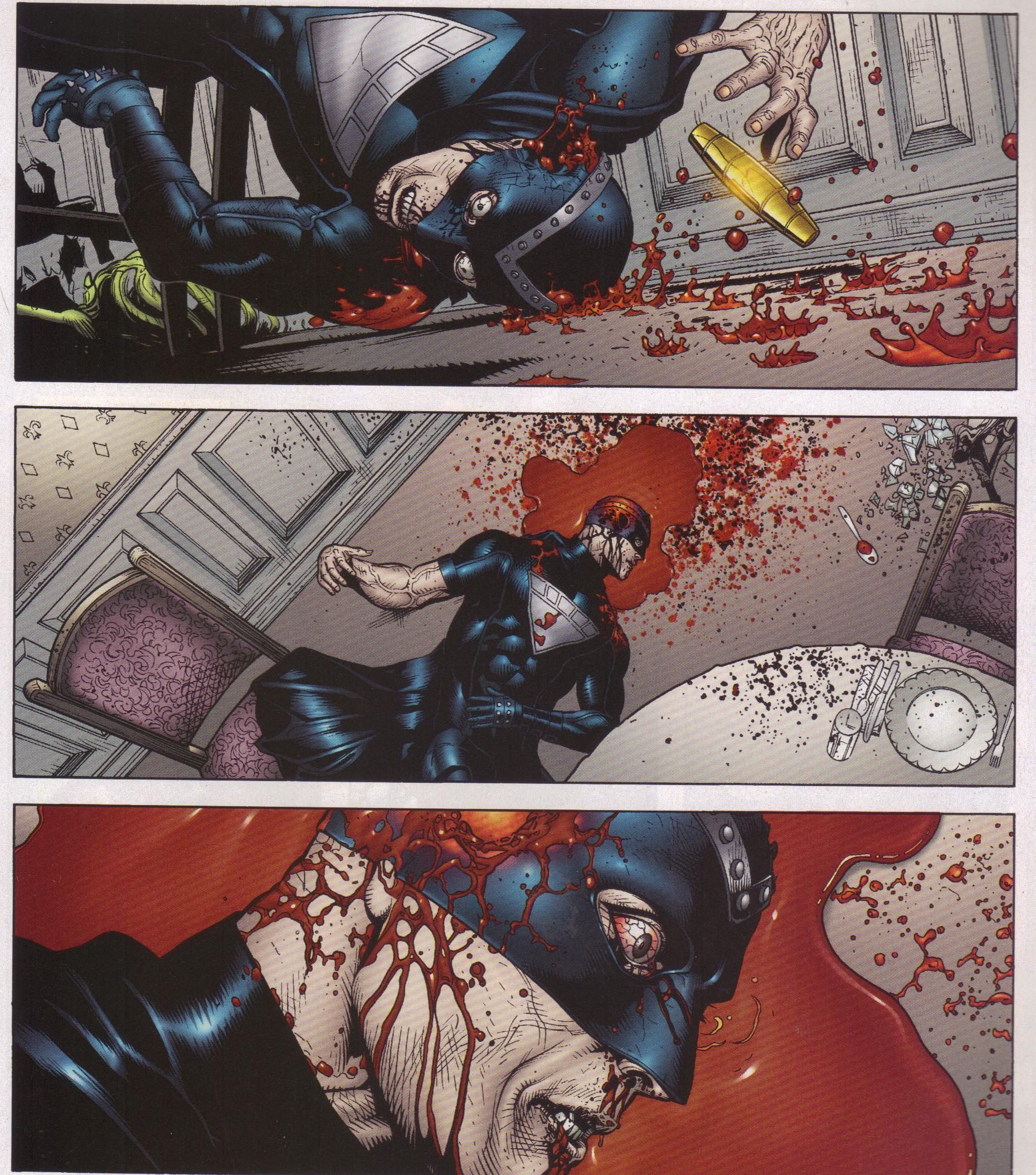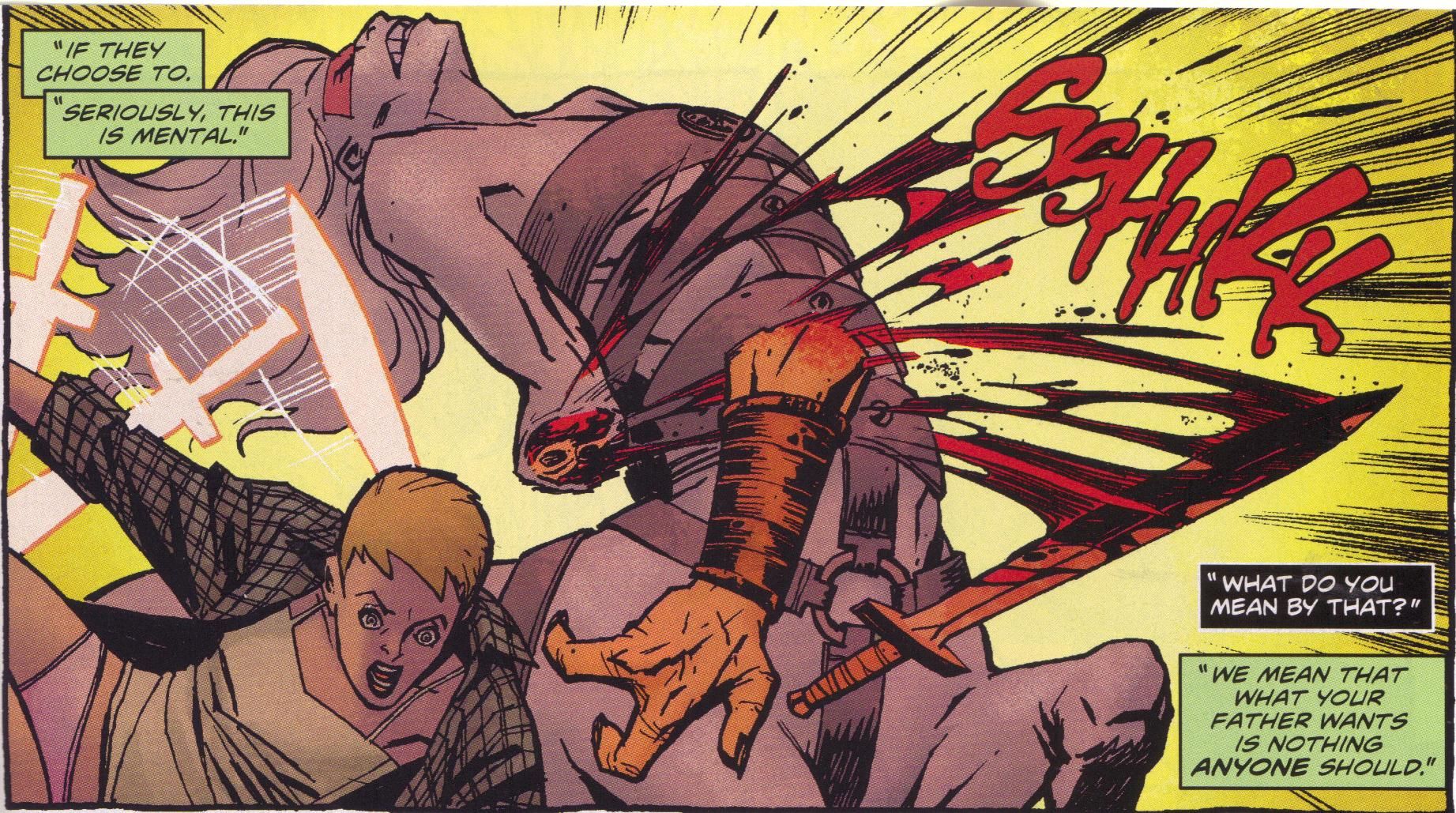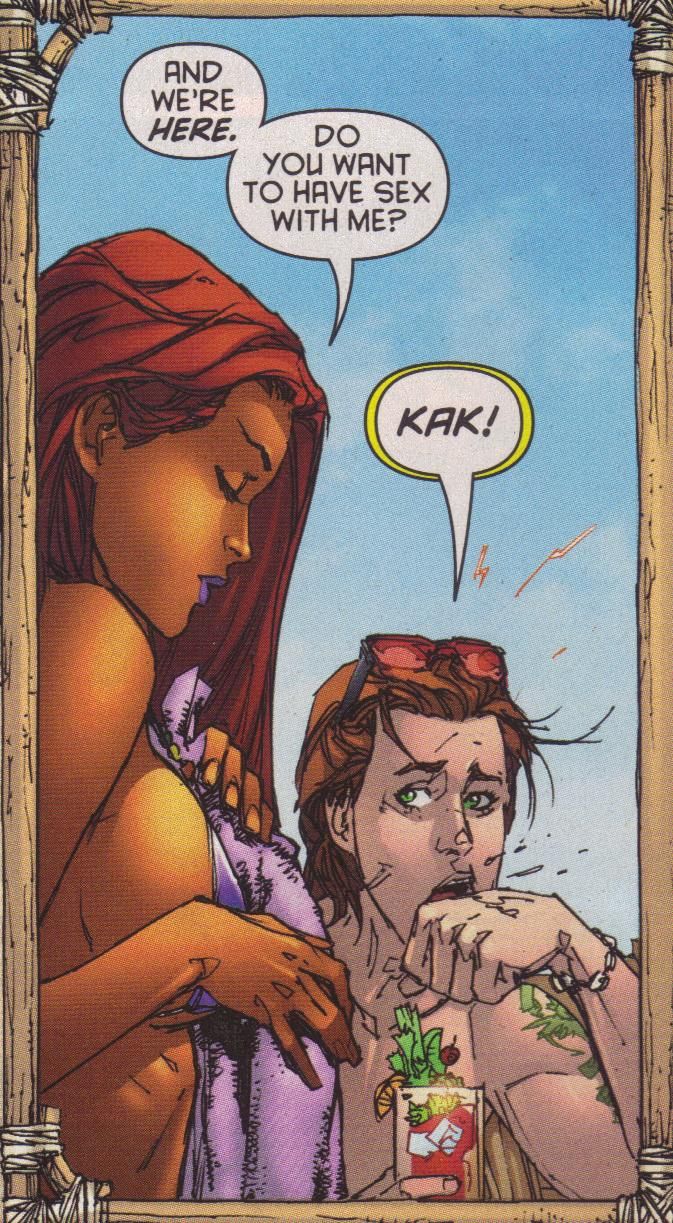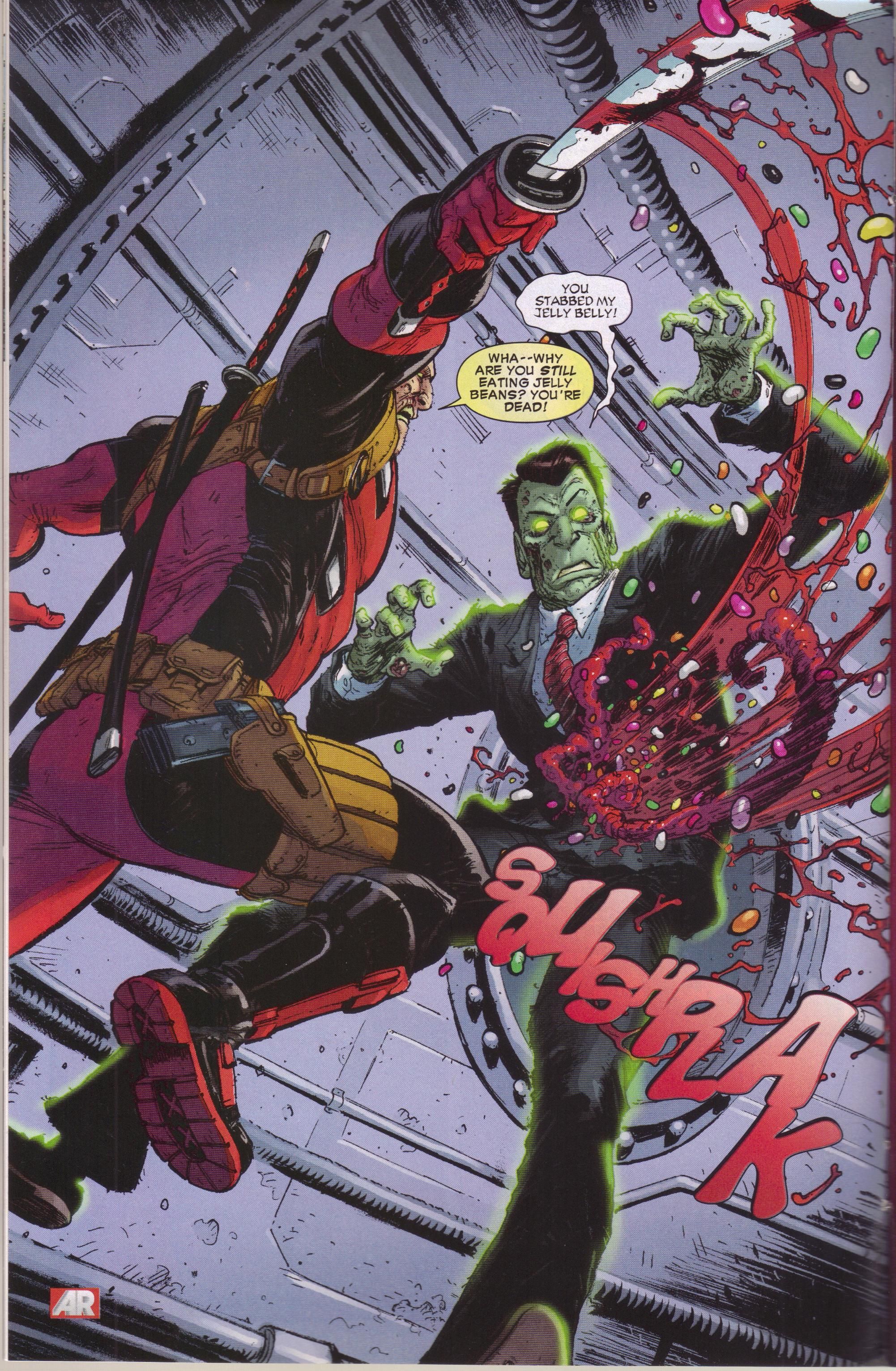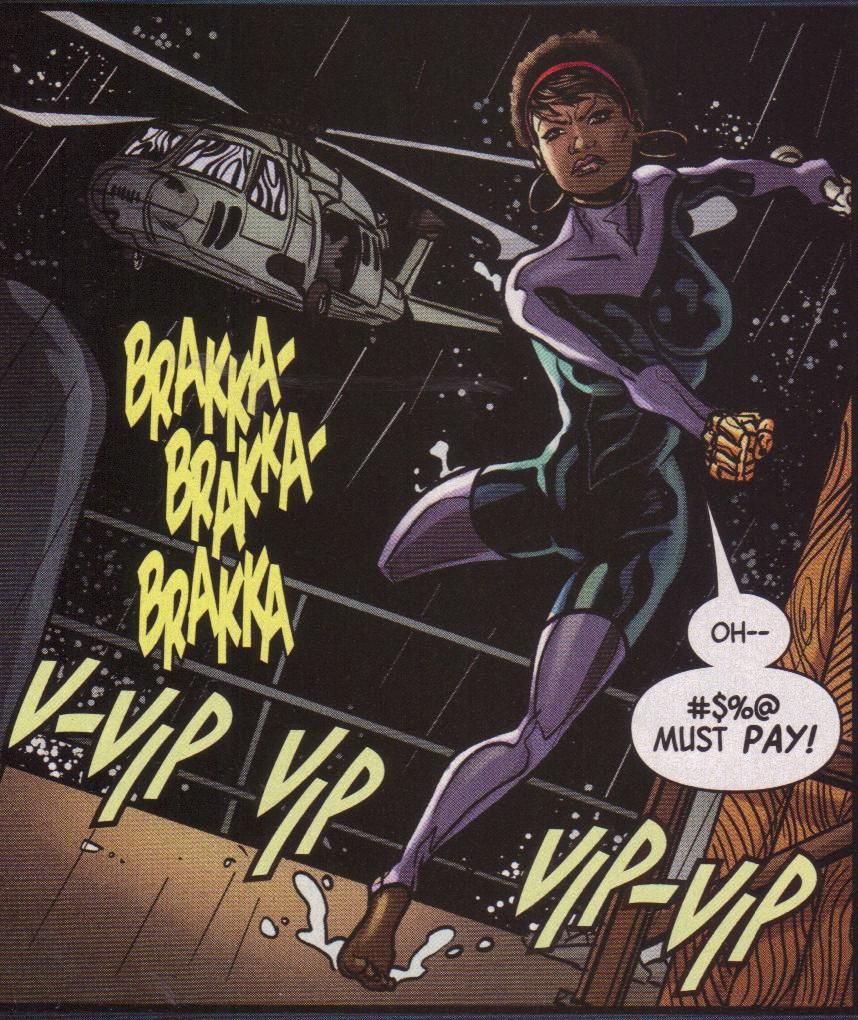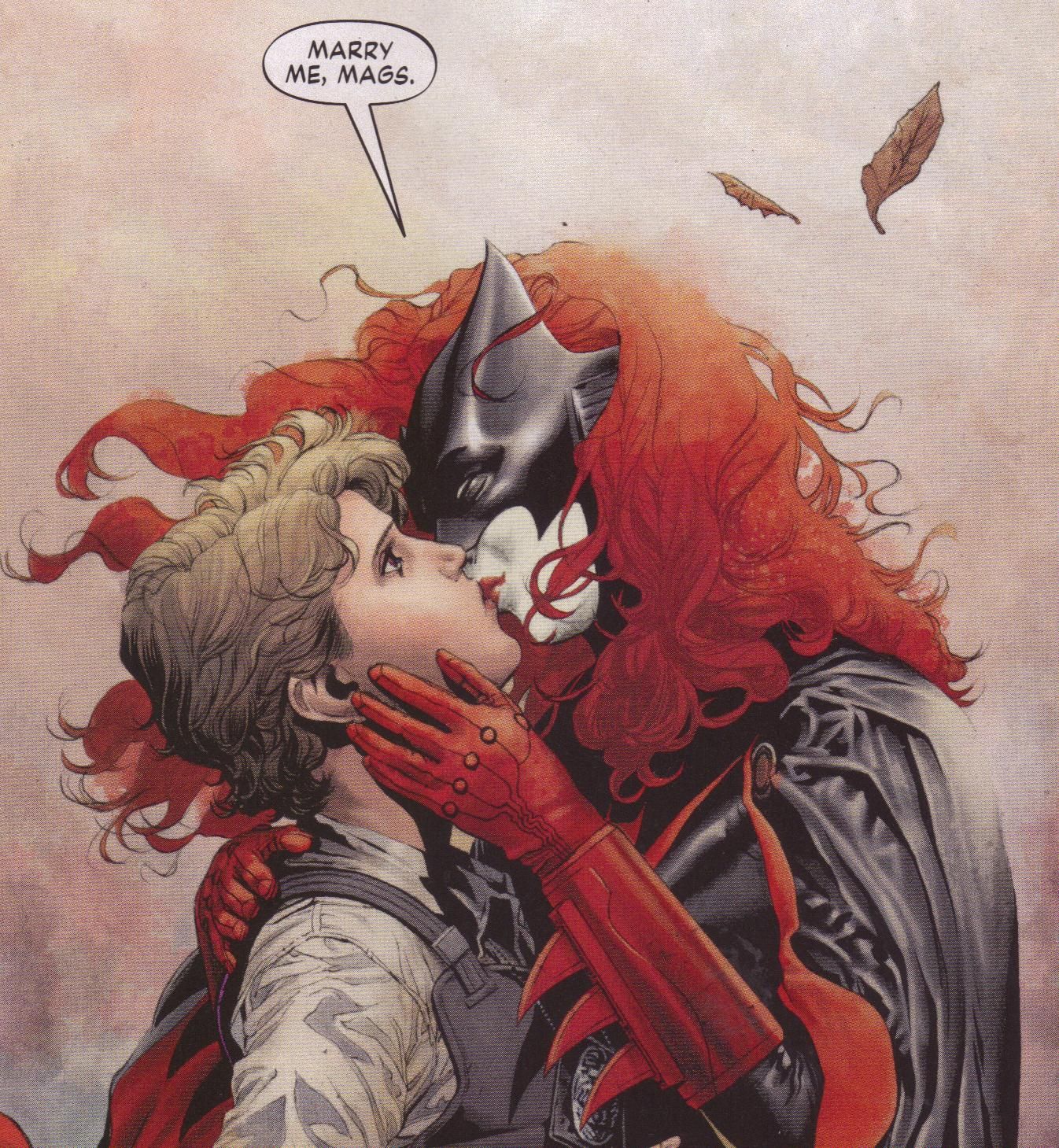A few weeks ago I got into a bit of an argument in the comments section for my latest "Flippin' through Previews" post. After it had played out, I thought the kernel of the argument would make an interesting post about the prevalence of superhero movies even as superhero comics are still ghetto-ized. Yes, it's another post where I postulate. I can postulate with the best of 'em, I reckon!
The argument concerned DC's April stunt, the "WTF" covers. If you don't want to go read it, I'll rehash: I wrote to Dan DiDio:
I know you've pretty much given up on trying to expand your audience by making your comics the slightest bit "kid-friendly." That’s cool, too. Eventually old nerds will die off, and my kid and others like her (I have a 7-year-old daughter, Dan, who digs comics) will be too busy reading comics that you don't publish, but until that happens, I'm sure you'll be peachy. But to name the entire month of gimmick covers "WTF April"? ... When you and your cabal came up with it, did anyone ... speak up and say, "Maybe we shouldn't do a cover promotion that is well known shorthand for 'what the fuck' when our stated goal of this non-reboot was to draw in new readers, which might include a younger audience?"? ... [M]ight you concede that the [theoretical] person has a point?
Well, that was the wrong thing to say, apparently. It began with Alex, who wrote:
you're really showing your age if you honestly don’t believe that "wtf" and, when spoken, what it stands for isn't in the common parlance of today's 13 year olds. And given the actual content of DC (And Marvel's) comics these days, that's really the lowest age bracket they're shooting for.
Stuff like that is stuff that concerns hand-wringing parents; it is far from mystifying or off-putting to the kids themselves. Remember, this is a world where 12 year olds are gleefully playing Call of Duty and Gears of War and are hugely active online. Curse words were tossed around liberally when I was 13 and that was 14 years ago.
I mistakenly said I was trying to raise my daughter to be a "good kid" in my response, but my point was that I know kids know what it means, but why should DC encourage it? Another commenter, Peter, wrote that his young grandson reads CBR and my use of "motherfucking" in the same column in which I took DC to task is ... hypocritical, I guess? And that's cool. I noted that I'm a different animal than DC - I don't claim to produce comics for the largest audience possible and that anything I write here should be read by children. DC, however, is very much concerned with producing stuff for kids, like lunch boxes and backpacks and such ... but their comics aren't very kid-friendly.
Sam chimed in with:
As amusing as your pearl-clutching offense at "WTF month" is, I really don't think your argument makes much sense. You don't think there's a middle ground between, say, The Disney Channel and HBO? Between movies rated "G" and movies rated "R"? Because almost everyone else thinks there is. That's the realm where broadcast network TV resides, that's there the vast majority of movies rated "PG" and "PG-13" reside, and DC keeps its standards for books not labelled either "All Ages" or "Suggested For Mature Readers" right in that middle ground. You can and do hear expressions like "WTF" on broadcast TV (I'm pretty sure Marc Maron has plugged his podcast by name on talk shows which make a big deal about still bleeping the word "fuck", even though they're on after midnight).
There are many things to criticize DC for, but going on and on about them adhering to content standards accepted by just about ever form of mass media in the US, well, that's The Craziest F#?king Thing I've Ever Heard (to quote a graphic which appears on the screen of a basic cable show which bleeps out the word "fuck").
I was a bit facile with my answer, but I wasn't sure what Sam's point was (sorry, Sam). As I've mentioned over and over, I don't care if DC calls it "WTF Month." I'm just curious if they considered that it might put some people off. If thinking about this stuff makes me a "pearl-clutcher," well, at least I think about things. This is, as I noted, a tempest in a teapot. I was just making a joke. Maybe I should leave that kind of thing to Chris Sims.
Sam came back with "Guess I'm not in my right mind, because I haven't seen anything in a DC Universe book that I would object to a 13-year old reading on the basis of content." I've seen plenty, but again, I'm a pearl-clutcher.
So why did all this back-and-forth inspire me? Well, the commenters seemed to suggest that there's nothing wrong with DC doing this because 13-year-olds are exposed to all of this crap, so why should it matter? My point is that yes, I know that 13-year-olds are exposed to this crap, but why should we simply accept it? Why would DC do something like this that will probably - I have no proof, of course - make them less "kid-friendly"? Consider that kids probably aren't buying comics anyway. I don't know if DC has done any studies that would support this contention, and I only have anecdotal evidence, but it seems like teenagers are not interested in comics. But let's say that DC wants kids to experience their comics. Wouldn't they appeal to parents at least a little, many of whom are far more likely to be "hand-wringing" than I am? Wouldn't they want parents to feel comfortable buying comics for their teenagers? I have mentioned to my daughter's school that they should have comics in the library (granted, it's an elementary school, but the principle is the same). I wouldn't even consider asking my daughter's (eventual) middle school to take a look at DC's output, because they would reject them out of hand. Wouldn't it be nice if kids could have access to collected editions of DC's superhero books in their school libraries? Am I just being an idiot? Wait, don't answer that.
The problem is starker when you consider how well superhero movies do. Since 2000, we've seen a renaissance of superhero movies, many of them tremendous winners at the box office. These are not just nerd movies, either - everyone sees these movies. If we just look at some of the numbers (all from Box Office Mojo), here's what we see (these are worldwide numbers, unadjusted for inflation):
The Avengers: $1.5 billion
The Dark Knight Rises: $1 billion
The Dark Knight: $1 billion
Spider-Man 3: $890 million
Spider-Man: $821 million
Spider-Man 2: $783 million
The Amazing Spider-Man: $752 million
Iron Man 2: $623 million
Iron Man: $585 million
X-Men: The Last Stand: $459 million
Thor: $449 million
X2: X-Men United: $407 million
Superman Returns: $391 million
Batman Begins: $374 million
X-Men Origins: Wolverine: $373 million
Captain America: The First Avenger: $368 million
X-Men: First Class: $353 million
Fantastic Four: $330 million
X-Men: $296 million
Fantastic Four: Rise of the Silver Surfer: $289 million
The Incredible Hulk: $263 million
Ghost Rider: $228 million
Green Lantern: $219 million
Ghost Rider: Spirit of Vengeance: $132 million
That's a shitload of money, yo. Even movies that "failed" like Ghost Rider or Green Lantern made over $200 million. Jonah Hex failed miserably, sure, but the track record of superhero movies is still pretty strong (and no, I'm not going to figure out how much all those movies cost to make, sorry), and there doesn't seem to be any end in sight. Marvel is making money hand over fist with this stuff, but even DC is getting into the act. Arrow is on the CW, sure, but it's been renewed for another season and has been getting better recently, and who knows how much money DC is making off of that. People who would never consider reading a comic adore these movies (and even watch Arrow, although the audience is probably smaller for that and, in the grand tradition of recent DC comics, it's far darker than most of the Marvel superhero movies).
There are, of course, a lot of reasons for this. People like going to see movies more than they like reading, for one. The serialized nature of comics, for another - there's a commitment issue with comics. Availability is another issue. I get it. But every single one of those superhero movies is rated PG-13, which I think is another point in their favor. We can argue whether the ultra-violence of the Batman movies deserves a PG-13 rating, but when you really look at these movies, there's really nothing in them that a parent of a teenager would object to. They're actual PG-13 movies, unlike the rather mealy-mouthed standards for mainstream superhero comics (as I'll note below). Again, this isn't what the kids themselves hear at school or the kind of video games they play. It's about what the parents think is appropriate. And I would argue that a parent would be much more comfortable with their kids seeing Heath Ledger's Joker shoot people bloodlessly or jam a pencil in someone's eye off-screen than let their child read whatever torture porn Scott Snyder is serving up in the comic these days. The companies that make superhero movies (Marvel and Warner Bros. included) are much more concerned with making their movies "kid-friendly" or at least "kid-neutral" than making their comics that way. There's very little blood in those movies I noted above. I remember the kerfuffle over Wolverine actually killing bad guys in X2 when it came out, even though there wasn't any blood. Yes, it might be unrealistic, but is it any more unrealistic than the gallons of blood that are spilled in your average DC or Marvel comic? It's one extreme or another, and one extreme gets people who don't read comics to take their entire families to see movies using those characters. There's also very little cursing in these movies. I'm sure someone will correct me if I'm wrong, but I think the strongest thing anyone says in your standard superhero movie is "ass." There's no cursing - technically - in most superhero comics, but if you're a parent and you happen to flip through an otherwise regular superhero comic, are you going to cringe a bit seeing "@$$" or some other grawlix? I will always argue that cursing a lot is lazy writing, but cursing when you know it's going to be obscured by symbols is even lazier. Hand-wringing parents might decide just on that alone to skip reading that comic. Yes, it's irrational, but a lot of human behavior is irrational.
I honestly don't have too much of a problem with silly shit like "WTF" month or even the gore that drenches a lot of superhero comics. I just don't buy them, and there are so many other options that I don't care. I'm only pointing this out because it's very weird how DC (and, to a lesser extent, Marvel) runs their business. Up in the comment I quoted, Sam claims that DC keeps its output in the "middle ground" of PG-13, which I totally disagree with. The problem is that DC and Marvel rate everything pretty much the same when the output is wildly divergent. If they had the balls to label some of their superhero books "For Mature Readers" and make others more appealing to kids and actually make sure the content reflected that, I would love it. But they don't. Wonder Woman, which is pretty clearly a horror comic, is rated "T," meaning, according to DC, that it's "appropriate for readers age 12 and older" and "may contain mild violence, language and/or suggestive themes." Does anyone think the violence in Wonder Woman is "mild"? It has the same rating as The Flash, which I haven't read but I hear is far more appropriate for younger teenagers. It is an absolute joke that Snyder's Batman is rated "T," as I doubt if the Joker wearing his skinned face as a mask is something any parent wants their 13-year-old reading. Batwoman, which is far less gory than Wonder Woman or Batman, is rated "T+" - presumably because it shows women kissing each other. THINK OF THE CHILDREN!!!! I don't know if Red Hood and the Outlaws has gotten less ... icky since issue #1, but it's rated "T." Some of the books are rated "appropriately," I suppose - Animal Man and Swamp Thing are both "T+," for instance - but it seems that those books, especially, are far more "T+" than Batwoman. DC doesn't appear to be consistent, in other words, and I know why with regard to Wonder Woman and Batman - they can't have their flagship titles alienating some parents. That's cool and all, but here's an idea - don't let Azzarello graphically slaughter people and don't let Snyder have the Joker prancing around with a skinned face.
Marvel uses "T+" for 12-year-olds and up, with "Parental Advisory" for 15-year-olds and up. It's a bit more difficult to rant about their stuff, because they've just relaunched so much of it and I haven't been keeping up too much, but Deadpool, Savage Wolverine, Wolverine, Thunderbolts get a "Parental Advisory," which sounds about right. I don't see anything of the "T" or "T+" books (and I don't know the difference between them; I can't find anything on-line about a Marvel "T" rating) that seems too outrageous, but again, I've only been keeping up with the first issues of the Marvel NOW! initiative, so I can't speak to those as well. It is, of course, ridiculous to even ask if any DC or Marvel books are labeled "E" (for "Everyone") in DC's case or "A" (ages 9 and up) in Marvel's case. Let's not get crazy, people!
Let's look at John Layman's current run on Detective Comics, mainly because I know Layman and talk with him "off the record" about a lot of his work. When he began his run, he told me he was trying to make it "age-appropriate," meaning that parents could feel all right with their kids reading it. It's not exactly "all-ages," but Layman said he was deliberately making it less graphic than most of DC's output. In issue #13, Layman's first issue, Oswald Cobblepot hires an assassin to kill Bruce Wayne. There's a good amount of violence, but only a small amount of blood. In the back-up story, Ogilvy conks someone on the head with a pipe, but there's no blood. He later shoots a dude, but the actual death takes place off-panel. When we see the corpse, we only see a tiny bullet hole and a small pool of blood. The book is rated "T," and it seems perfectly fine for a 13-year-old, even one with nervous nelly parents. Of course, parents who object to this are probably not going to let their kids read comics anyway, so there's that. In issue #14, another dude is killed, and there's a small amount of blood, but it's off to the side and easy to miss. In the back-up issue, someone hangs themselves, but we see only his feet. Clayface shows up in issue #15, so there's a bit more splatter, but it's obviously mud, not blood, so artist Jason Fabok can get away with it. Issue #16 is another "Death of the Family" pseudo-crossover, so it's a bit more disturbing, but not terribly so. At one point we see a dentist's bloody instruments, but there's not a lot of blood and we don't see what he did with them. There are more dead people than in the earlier issues, but the art doesn't show too much, leaving a lot of it to our imagination (imagine that!). There is one somewhat gruesome panel where a kid cuts off part of his face, but Fabok just draws muscle, and while it's red, it's not dripping with blood. In the back-up story, there's a dead dude with part of his face burned off, but artist Andy Clarke doesn't make it too gruesome, and Blond, the colorist, keeps the red muted, so it easily looks like paint. There's another panel showing some dead people, but again, the blood is minimal and understated. And in issue #17, another "Death of the Family" chapter, there's no blood and no death - a woman is tied in a chair and threatened with a knife, but nothing happens to her. In these five issues, Jim Gordon says "Dammit" once, and that's it. You can argue about the quality of Layman's run (I think it's pretty good so far), but you can't argue that he manages to write exciting stories with a good amount of violence that never become what most parents would think is inappropriate. Layman understands that it's easy to write something that shows the Joker peeling his own face off. It's harder to write a script that doesn't show everything, which makes the reader imagine it. In his Detective Comics run so far, he and Fabok and Clarke have been doing a good job hinting at awful things without showing them. He's also given us a Batman who doesn't necessarily act with his fists first. Batman tries to help Ivy, and he listens to the kid who turns against the Joker-worshipers instead of simply pounding him. He's certainly not a touchy-feely Batman, but he's a lot nicer than most recent portrayals of Batman. My point is that it's possible to write a DC comic that doesn't wallow in gore and unpleasant heroes. Layman's Detective is "dark" in terms of delving into some uncomfortable situations, but Layman and the artists don't allow it to be something that would repel parents who are looking at what their kids read.
As I've noted, I have no idea if making their comics slightly more "kid-friendly" would result in more sales for DC and Marvel. I suspect that movies have so many other advantages over comics that the printed adventures of your favorite heroes will always lag far behind them. As I've mentioned many, many times, I would be perfectly happy if DC and Marvel went one way or the other: either truly embrace the fact that kids don't read your comics and make them actually "adult" - meaning violence that actually has consequences, language that doesn't need stupid symbols to represent it, and clothes that rip and expose private areas every once in a while; or try to make them more kid-friendly and get rid of the gore, the grawlix, and the ass shots. But DC and Marvel don't want to do that. They want to straddle a middle ground, and I think it makes parents freak out when they see what their younger kids are reading and it bores adults. With a lot of superhero comics (more on the DC side, but for Marvel, too), the only impetus to buy them is because you love the character. And guess what? That's a shitty reason to buy a comic.
But this is just me ranting. I think it would be pretty cool if superhero comics sold better. If DC and Marvel are happy with most of the their comics selling less than 30,000 copies, more power to them. I love buying comics for my daughter, my nephew, and some of my friends' kids who like superheroes. My 10-year-old nephew reads Star Wars: Legacy by Ostrander and Duursema and really enjoys it. I very much doubt if I will ever buy him anything from the DCnU. Whenever you hear about how adults get into comics, it's usually not that they started when they were 25 and thought they were awesome, it's because they loved them when they were kids. I began reading comics when I was 17 and I think I'm on the old side for getting into them. Again, I could be completely off-base here, but I know a lot of people who love superhero movies and would never think of buying comics for their kids. I imagine that the lack of "kid-friendly" comics is way down on the list of why that is, but I believe it's probably one factor. I may be clutching my pearls and lying on the fainting couch when I look at some of the comics that are being published now, but if you think I'm crazy, imagine parents who aren't as involved in comics as I am. I just wonder if DC and Marvel even think about this stuff when they come up with their wacky ideas.


